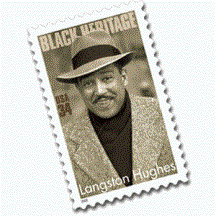
Poetry Presentation, spring 2006
LITR 5731:
Seminar in American Multicultural Literature

Poetry Presentation, spring 2006
Thursday, 23 February
Poetry: Langston Hughes, "Harlem (A Dream Deferred)"; "Dream Variations"
Poetry reader / discussion leader: Kim Pritchard
 Langston
Hughes
Langston
Hughes
Hold
fast to dreams
For
if dreams die
Life
is a broken-winged bird
That
cannot fly.
-Langston Hughes, “Dreams”
“An
artist must be free to choose what he does, certainly, but he must also never be
afraid to do what he must choose.”
-Langston
Hughes, “The Negro Artist and the Racial Mountain”
3a.
African American alternative narrative:
“The Dream”
("The Dream" resembles but is not identical to "The American Dream." Whereas the American Dream emphasizes immediate individual success, "the Dream" factors in setbacks, the need to rise again, and a quest for group dignity.)
Freedom of personal expression, whether personal or
collective, is one of the many legacies of Hughes, who has been called “the
architect” of the black poetic tradition. This author refused to differentiate
between his personal experiences and the common experience of Black America.
His canon is the largest of any African American poet
(16 books of poetry, two novels, two autobiographies, seven collections of short
stories, five nonfiction works, nine children’s books, more than 30 plays).
“He made literature what it was supposed to be, for
the people.”
-Langston
Hughes Centennial, “The Beat Goes On” (2002)
“He loved being black and made it possible to be so
without shame.”
-Langston
Hughes Centennial, “The Beat Goes On” (2002)
“Like the sharp peal of a jazz trumpet, Hughes'
poetry announced to the world that the streets of black America contained a
culture rich and vibrant and fiercely poetic.”
-Jeff Trussell, “Poet Heroes”
“Harlem”
The author’s use of graphic imagery and imaginative
similes leads the reader into the impoverished, desperate world of Precious
Claireece Jones. Locked in a world of deferred dreams, Precious struggles to
survive the blackness that has stifled her hope for success. Precious holds
desperately to her dream of becoming an educated woman who dares to rise above
her bleak existence. Unfortunately
for Precious, her success may once again come to a screeching halt and
subsequently explode due to the tragic fact that she now carries the AIDS virus.
“Dream Variations”
In this poem Hughes creates a palpable tension
between black and white. In the
first stanza, the dream is to dance and whirl within the dominant culture
without truly being a part of that culture. The African Americans merely occupy
space within the culture.
Unlike “Harlem,” this poem celebrates the
“dream” and its possibilities. Hughes encourages the African American to realize and
consequently celebrate the dream of living harmoniously within the dominant
culture.
The second stanza brings the reader into a world
where the African American has become an essential member of the community and
not just an outsider looking in. Macon
Dead is a perfect example of the outsider looking in.
Macon’s purpose in life is to acquire things –
car, property, money – and he subsequently lives a modified version of the
American Dream. However, Macon’s
dream will never be fully realized because he attempts to achieve a dream that
has limits for the Black American.
Conversely, Milkman finds Hughes’ dream when he
returns to honor his past. Only
then is Milkman able to “fling [his] arms wide/ In the face of the sun” and
rest peacefully and contently in the fact that he is a Black American.
Unfortunately, Macon Dead never comes to this realization.
Discussion Questions - “Harlem” and “Dream
Variations:”
1. Precious references Langston Hughes several times throughout the narrative Push.
Given Hughes’ celebration of the Black Aesthetic as well as his
insistence on accurately portraying the African American community and culture in his work, what parallels can we draw between
Precious’ dream, the African-American dream, and Hughes’ “dream deferred?”
2. “Dream Variations” can be read as a poem celebrating the
assimilation of the African American into the dominant culture.
In what ways does the speaker in the poem embrace the new culture?
Conversely, in what ways does the speaker assimilate into the dominant culture with reservations and limits? Take
into account the poetic devices used in the poem for the specific purpose of illustrating
this point.
|
|
|
|